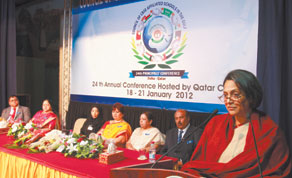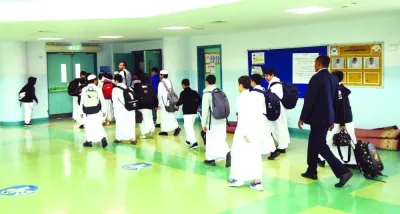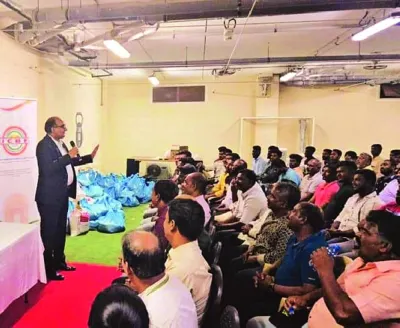 |
| Indian Ambassador Deepa Gopalan Wadhwa addressing the delegates at the opening of the 24th annual meeting of the Council of the CBSE-affiliated Schools in the Gulf region at MES Indian School yesterday. PICTURE: Jayaram |
Indian Ambassador Deepa Gopalan Wadhwa has urged the managements of the CBSE-affiliated schools in the region to explore possibilities for setting up open schools along with their regular classes to benefit those students who are unable to cope with the growing challenges of the new educational system.
The envoy said this while inaugurating the 24th meeting of the Council of the CBSE-affiliated Indian Schools in the Gulf region at MES Indian School yesterday. It is the third time Qatar is hosting the meeting since the council came into being in 1986.
Sympathising with those students, who are generally perceived as “weak” in their academics, and getting little support from homes owing to numerous compulsions, the envoy said it was high time school managements thought of giving equal educational opportunities to all.
Even while educational achievements of the CBSE schools in the Gulf region, particularly those in Qatar, Wadhwa also called upon the operators to consider providing equal educational opportunities to physically disabled and differently able children. “Even though some schools have made provisions for the studies of such differently able children, most Indian schools in the region have no facilities to boast of to meet the educational requirements of unfortunate students,” said the ambassador.
Terming the educational reforms introduced by Indian Human Resource Minister Kapil Sibel in 2009 as “very progressive, and having long vision”, the ambassador said the Right To Education (RTE) Act initiated by the minister would contribute to remarkable changes in the Indian educational system in the long run.
Wadhwa also gave a call to the region’s Indian school managements to adhere to the health, safety and environment standards prescribed by the educational authorities. Implementation of superior HSE standards would improve their reputation among other nationalities as well and would ultimately help attract more nationalities to the Indian educational curriculum, said the ambassador.
Advocating the importance to improving academic and co-curricular activities in the region’s Indian schools, the ambassador mentioned that nearly 70% of the Indian population was below 35 years and hence there was an urgent need to ensure quality education to the upcoming generations. “It is unavoidable at a time when they are faced with many mounting challenges at the global level.”
Wadhwa also remembered the former principal of Doha Modern Indian School (DMIS) Neville Noronha, who passed away last month in India. “I could still recall the dynamism and enthusiasm demonstrated by a young Noronha while he was serving a school in Kanpur.”
Noronha was heading a school in the UAE when died in December.



